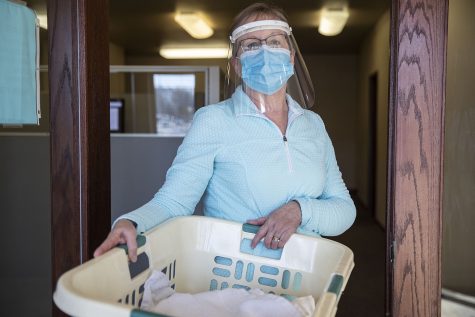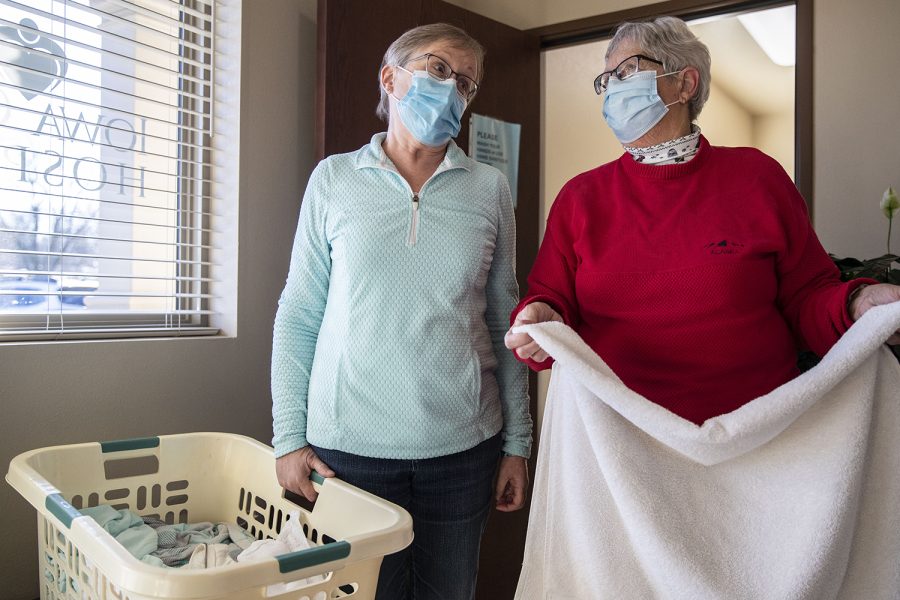Volunteers at Iowa City Hospice provide emotional support to patients at the end of their lives
Hospice volunteers are needed now more than ever during the pandemic. While some may not be able to continue volunteering because of health concerns, many are finding unique ways to support patients at the end of their lives.
Volunteers Sue McConnell and Maggie Keyser pose for a portrait at the Iowa City Hospice offices in Iowa City on Tuesday, Jan. 25, 2022. Iowa City Hospice volunteers have been working hard to find ways to support patients during the COVID-19 pandemic. McConnell has been volunteering her time and support since 2005. Keyser currently volunteers her time and resources doing laundry for a patient.
January 25, 2022
On a sunny day in March near Iowa City, Sue McConnell, 75, sat with a 92-year-old hospice patient watching the 2021 girls’ state basketball tournament.
As McConnell’s patient, and now friend, contemplated the end of her life, McConnell provided a moment of relief by engaging in a conversation about their shared passion: basketball.
McConnell recounted her time playing 6-on-6 basketball as a teenager, and the patient shared her experience as a girls’ basketball coach.
One of the reasons she volunteers is because of stories like this, McConnell said.
“You find out things about them and care for them, but you get rewarded, too, by hearing about their stories,” McConnell said. “It’s nice when you can find humor during tough times.”
Since 2005, McConnell has provided support for patients and their families in many ways, but the most important part to her is building that connection as patients near the end of life.
Volunteers change lives
Hospice volunteers are one of the most important groups of people in the lives of patients as they experience their final days, said Karla Kamal, CEO of Iowa City Hospice.
“People have one experience as they’re dying and bringing their family together, and they will remember this forever,” Kamal said. “What happens in the last few days is indelibly etched in their minds, so it’s important that we have volunteers who place our patients at the very center.”
Volunteers provide support in many ways, including cleaning, cooking, walking the dog, and other day-to-day activities that keep patients’ lives running smoothly. Additionally, volunteers are some of the last people to see patients before they die, providing a listening ear and a comforting presence.
“You really get to know the people, and I get so much more from them than they get from me,” McConnell said. “I give them time to do what they need as they lose control of their lives, and I remind them that they’re still valuable people on this Earth.”
RELATED: Supporting and being supported: Mothers navigate life over a year of COVID-19
Choosing hospice care
“When I tell people about my job in hospice care, they always ask, ‘isn’t it depressing?’” Kamal said. “It’s not depressing…it’s rewarding.”
Kamal said she worked as a nurse for several years in the Cardiovascular Intensive Care Unit at the University of Iowa. She also worked as a nurse manager for Mercy Hospital in Iowa City for five years.
“I saw a lot of people die peacefully in the ICU, and I know it can be more beneficial for people to be at home when they pass,” Kamal said. “Being part of that experience was incredibly rewarding, and I wanted to continue to provide support after I left nursing.”
McConnell, a retired nurse, said she chose hospice volunteering because it felt like a natural extension of what she did in the medical field, watching lots of patients die in quick and traumatic ways.
Hospice allowed her to spend more time with patients at the end of their life, which she finds more rewarding than watching them die in hospitals, McConnell said.
“It’s hard for me, too, because I get to know them and then they’re gone,” McConnell said. “You experience the death too — you form an attachment, and it’s like you’ve lost a friend.”
Kamal said it’s important to remember that these patients are still alive, and volunteers work to make them feel valued at the end of their lives.
“Our patients are all alive — that life has value — and their family has value as we continue to care for them,” Kamal said. “We try to focus on normal life things and focus as much on their symptoms and whatever medical care they need — we provide emotional support.”
Maggie Keyser, 63, a retired teacher from Iowa City, said she saw the impact of hospice when she lost her aunt in 1989 and her mom in 2010.
“Hospice was really helpful to my family, and we benefited so much,” Keyser said. “After I retired, I wanted to find a way to help in this area and give patients and their family more time together.”
Keyser said she has been a volunteer since 2014, and she continues to build strong connections with her patients, which is why she loves what she does.
Most volunteers stay for several years, because they find the work rewarding, said Sarah Valiga, volunteer coordinator for Iowa City Hospice.
“We don’t get a lot of short-term volunteers; once they start, they stay for a while,” Valiga said. “The pandemic has definitely affected us, but I’m impressed by our volunteers’ willingness to keep asking what they can do and finding creative ways to stay connected.”
Barbara Barrows, Iowa City Hospice Chief Marketing Officer, said the organization started as a community, volunteer-based, non-profit group. In 1983, hospice was a new practice, and Iowa City was one of the first places in the state to offer this type of care, she said.
Iowa City Hospice provides service over 3,955 square miles, Barrows said, which includes Iowa City, Muscatine, Tipton, and other smaller cities in the area.
“We go wherever someone’s home is, whether that be a trailer, a tiny home, an apartment, a house, or anything else,” Barrows said. “We want them to feel comfortable, and their home is where they feel their best.”

Pandemic changes
The pandemic changed a lot of things for Iowa City Hospice, especially how volunteers could provide care to their patients, Valiga said.
Valiga said Iowa City Hospice suspended in-person volunteer visits in April 2020 before resuming them in September 2020. In December 2020, in-person care was suspended again before resuming in April 2021.
Volunteers found creative ways to stay involved in patient care that protected themselves and their patients during the peaks of the pandemic, Valiga said.
“Many of our bereavement volunteers showed their dedication, which, for me, is the best part of having volunteers — their dedication to patients and their care,” Valiga said. “Our volunteers worked on projects from home and found unique ways to stay in touch with patients.”
However, Valiga said she’s hopeful that more people will begin volunteering soon. At the end of February, Valiga is leading a training class that already has 16 people signed up.
“It’s difficult because several of our volunteers have had to ask to not do in-person visits, since many of them are older and have health concerns,” Valiga said. “Some of our volunteers also work in health care and as teachers — settings that put them at higher risk for getting COVID-19.”
Volunteers continued to step up in other ways, too, Kamal said.
“We didn’t have the tools at the beginning of the pandemic to have in-person care, so our volunteers made masks and gowns to help,” Kamal said. “Now people can be safe, and we’ve learned how to do things more efficiently or in a different way.”
Keyser said it was hard for her to be away from her patients.
“One lady I visited almost every day before the pandemic always asked when she could see me,” Keyser said. “It was difficult, because I wanted to see her and be there for her, too, but the pandemic made it impossible at the time.”
RELATED: ‘Ben didn’t kill Ben, COVID-19 did’: COVID-19 psychosis impacts Morris, Illinois family
Get involved
Valiga said it’s not too late for people to sign-up to volunteer in time for the training session happening Feb. 25 and 26. Those who are interested can check out the volunteer tab on Iowa City Hospice’s website.
Volunteers are expected to receive quarterly education, which includes meeting competencies to provide support and care, Valiga said. She said volunteers are treated like unpaid staff, so they have to learn to chart and keep track of the time they work.
People must be 18 and pass a background check to become a volunteer, Valiga said. They are also required to attend a two-day training program and commit to volunteering for at least one year.
“We are very protective of our patients, so volunteering requires a high-level of integrity and ability to follow through on commitments,” Valiga said. “It’s more than just a job or volunteering for us — it’s changing lives.”






